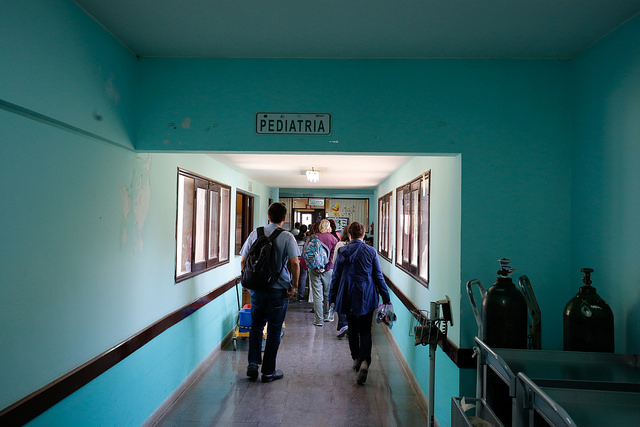Gospel Reflection: Fifth Sunday of Lent
“He cried out in a loud voice, ‘Lazarus, come out!’
The dead man came out, tied hand and foot with burial bands, and his face was wrapped in a cloth. So Jesus said to them, ‘Untie him and let him go.’”
Reflection by Lindsay Doucette
Abel was four years old when his life changed forever. On a day like any other, he fell, hit his head, and began convulsing. Family members rushed him to the nearest hospital in the remote river town of Riberalta, Bolivia, where doctors performed a CT scan revealing a brain tumor at the base of his skull. There was little they could do so they advised the family to make the twenty-four hour road trip to Santa Cruz where a neurosurgical team might be able to perform the complex surgery needed to remove the tumor. Abel’s aunt, Mercedes, who raised him from birth, was distraught and overwhelmed with the weight of the news. Not knowing how she would be able to manage the immense medical and travel expenses, she reached out for help.
In today’s Gospel, we hear Martha’s desperation as she cries out to Jesus to save the life of her dying brother, Lazarus. We sense the magnitude of Martha’s suffering when Jesus arrives too late. She struggles to hold on to her faith while wrestling with feelings of despair and hurt, knowing that Jesus could have done more.
The human experience of struggling to maintain hope in the face of despair unites Martha’s story with our own. Yet, somehow these fragile spaces in life have the opportunity to become spaces where God’s goodness and grace become vividly clear to us.
We can give thanks to God that stories like Abel’s continue. After discovering the difficult socio-economic situation of Abel’s family, doctors requested that his case be considered for an upcoming Solidarity Bridge Neurosurgery Mission. As a chaplain on this mission, I went to meet Mercedes in the hospital before the surgery. As she told her story, the tears began to flow – hers and mine. I put my hand on her shoulder and vowed we would be with her in prayer throughout the surgery and in the days and weeks of recovery that would follow.
As an international team of surgeons made their way to the place of the tumor, I made my way to the chapel on the first floor of the busy public hospital and began to pray for Abel and his family.
The closer Jesus gets to Martha and Mary, the more deeply he feels their pain, their grief, their loss. He starts out proclaiming that those around him will see a mighty miracle to the glory of God, but then he encounters Martha and Mary grieving. He arrives at the sealed tomb of his friend, Lazarus and we hear the shortest verse in all of Scripture, “Jesus wept.” In this very human moment, Jesus demonstrates something we have all experienced. It is one thing to talk about solidarity and compassion, but until we come face to face with the suffering of another, it is easy for us to dismiss their pain. Encountering and accompanying others during fragile moments, allows us to participate in God’s creative force for life in the world.
While Abel’s surgery was successful, I imagine the road to recovery will be a long one for him and his family. As a result of our human connection, Abel and his family remain in my heart, my thoughts, and my prayers. A few weeks after the surgery, I inquired about Abel and was told he remains in stable condition in the intensive therapy unit of the public children’s hospital in Santa Cruz. I imagine his aunt putting him in God’s hands every day. Her goodness was and is a testament to me, as is the goodness of the surgeons who travel far from home to partner with their Bolivian colleagues to provide needed surgeries and surgical training.
While Jesus miraculously raises Lazarus from the dead, he leaves the work of unbinding him and setting him free to Lazarus’s community of family, neighbors, and friends. We too are called to this work of healing and justice. In the words of Pope Francis, "Our revolution comes about through tenderness, through the joy which always becomes closeness and compassion.” This Lenten season, Christ shows us the power of compassion to work wonders. He calls us to “Come out!” and make this compassion real in our own lives and in the lives of all we encounter.
Loving God,
In the story of Lazarus, you show us that life is stronger than death, that love is stronger than hate, and that resurrection is possible through the compassion of human encounter. Give us the courage to be forces for life and resurrection in the world, using the gifts you have given us to share.
Amen.
Lindsay Doucette is Solidarity Bridge’s Senior Director of Programs. She holds a Masters degree in Nonprofit Management and previously served as a Maryknoll Lay Missioner in Cambodia. She spent the fall of 2017 in Bolivia working closely with our partners at Puente de Solidaridad and accompanying three Solidarity Bridge mission teams.
PRAY - FAST - GIVE
Your Lenten almsgiving will restore lives and
relieve suffering in Bolivia.
* Catholic liturgy provides two sets of readings for the middle three weeks of Lent. One set is used to accompany those who are preparing to be baptized and enter fully into the life of the Church. In solidarity with their journey of faith, we have chosen those readings for this week.
Sign up to receive our weekly Lenten Reflections direct to your email inbox.


